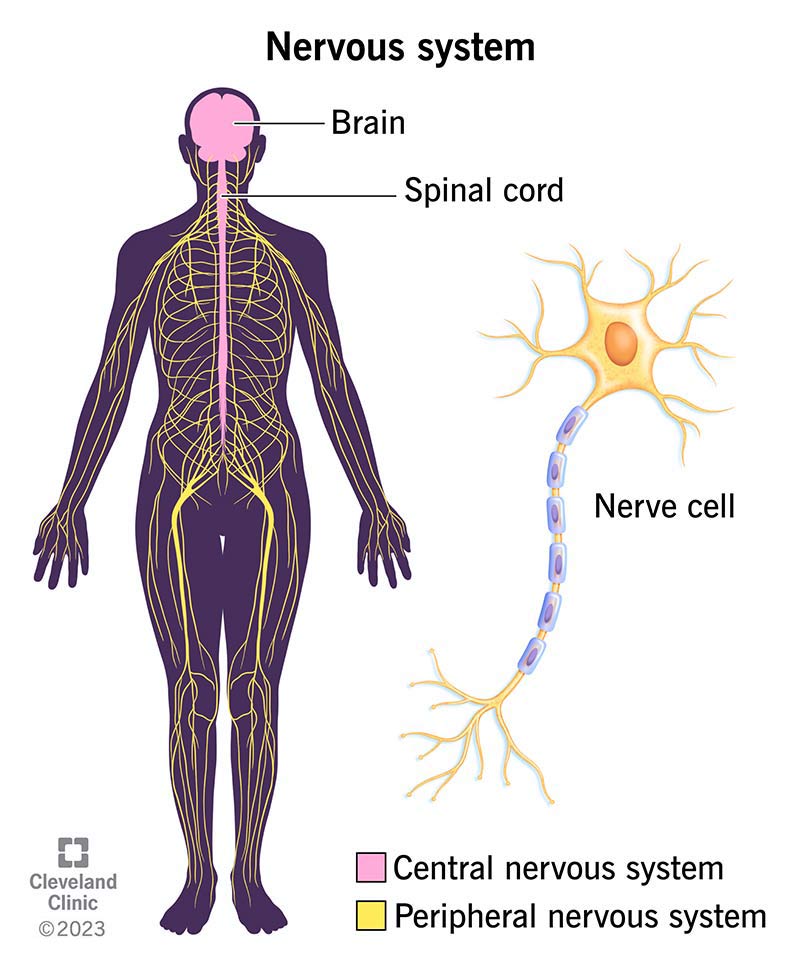Your nervous system plays a role in everything you do. The three main parts of your nervous system are your brain, spinal cord and nerves. It helps you move, think and feel. It even regulates the things you do but don’t think about like digestion. It contains the central nervous system and the peripheral nervous system.
Advertisement
Cleveland Clinic is a non-profit academic medical center. Advertising on our site helps support our mission. We do not endorse non-Cleveland Clinic products or services. Policy

Image content: This image is available to view online.
View image online (https://my.clevelandclinic.org/-/scassets/images/org/health/articles/21202-nervous-system)
Your nervous system is your body’s command center. It’s made up of your brain, spinal cord and nerves. Your nervous system works by sending messages, or electrical signals, between your brain and all the other parts of your body. These signals tell you to breathe, move, speak and see, for example. Your nervous system keeps track of what’s going on inside and outside of your body and decides how to respond to any situation you’re in.
Advertisement
Cleveland Clinic is a non-profit academic medical center. Advertising on our site helps support our mission. We do not endorse non-Cleveland Clinic products or services. Policy
Your nervous system regulates complicated processes like thoughts and memory. It also plays an essential role in the things your body does without thinking, like blushing, sweating and blinking.
Your nervous system’s main function is to send messages from various parts of your body to your brain, and from your brain back out to your body to tell your body what to do. These messages regulate your:
Your nervous system uses nerve cells called neurons to send signals, or messages, all over your body. These electrical signals travel among your brain, skin, organs, glands and muscles.
The messages help you move your limbs and feel sensations, like pain. Your eyes, ears, tongue, nose and the nerves all over your body take in information about your environment. Then, nerves carry that data to and from your brain.
There are different types of neurons. Each type of neuron has a different job:
Advertisement
The nervous system has two main parts:
There are two parts to your peripheral nervous system:
Nerve cells (neurons) are the basis of your nervous system. There are 100 billion neurons in your brain. These cells connect throughout your entire body.
Imagine your nervous system as a tree. Your central nervous system is the trunk of the tree that contains your brain and spinal cord. The tree branches are your peripheral nervous system (nerves). The branches extend from the truck (brain and spinal cord) to reach all parts of your body.
There are many conditions that affect your nervous system. Some of the most common include:
Signs and symptoms of nervous system conditions vary by type but may include:
Some conditions, like a stroke, are medical emergencies that need treatment quickly. If you notice the following symptoms, contact 911 or your local emergency services number:
A healthcare provider may use one of the following tests to check the health of your nervous system:
Advertisement
A healthcare provider will review your symptoms to diagnose and treat any conditions that affect your nervous system. Treatment varies for each condition. So, your healthcare provider will take into consideration several factors, like your age and general health, to create your treatment plan. This plan may include:
You can keep your nervous system healthy by:
Contact a healthcare provider right away if you notice sudden changes to your health like:
If you or a loved one shows signs of a stroke or seizure, contact 911 or your local emergency services number.
Advertisement
Your nervous system is the command center for your entire body. It helps you think, learn, move and remember. This vast network of nerves connects to all of your organs, muscles and glands. It needs care to keep working. Sometimes, unexpected events can affect your nervous system, like an infection, injury or underlying condition. A healthcare provider can help you stay healthy so your nervous system has all it needs to function as expected.
Advertisement
Learn more about the Health Library and our editorial process.
Cleveland Clinic's health articles are based on evidence-backed information and review by medical professionals to ensure accuracy, reliability, and up-to-date clinical standards.
Cleveland Clinic's health articles are based on evidence-backed information and review by medical professionals to ensure accuracy, reliability, and up-to-date clinical standards.
If you have a neurological condition, you want expert advice. At Cleveland Clinic, we’ll work to create a treatment plan that’s right for you.
